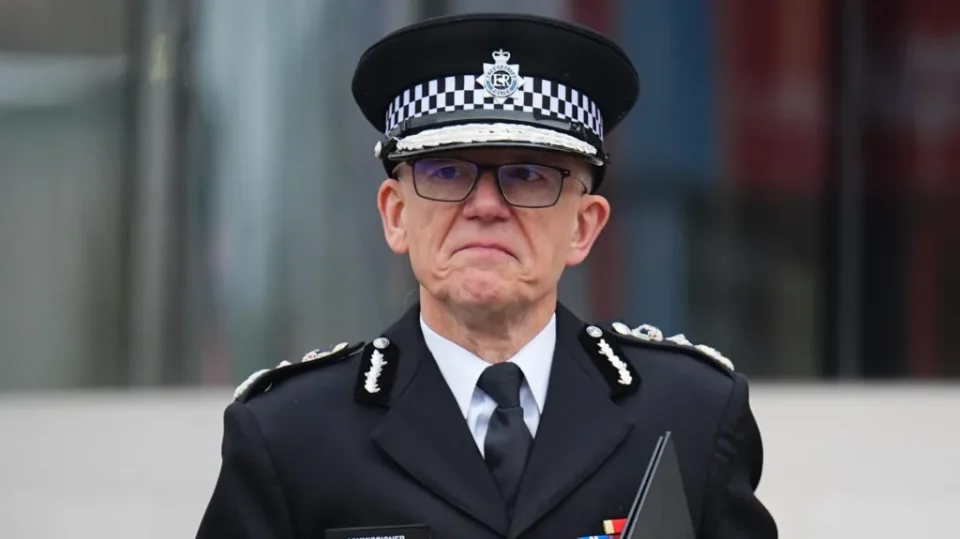Met Commissioner Sir Mark Rowley described policing as being in a “desperate position” following a High Court decision that ruled an officer accused of rape could not be dismissed due to an inherently unfair process.
This ruling originated from Sgt Lino Di Maria’s legal challenge after his vetting status— a thorough background investigation— was rescinded amid sexual assault allegations, which he denied and over which he was not charged.
Sir Mark pointed out that the Metropolitan Police currently lacks a viable procedure to remove officers who do not meet the standards necessary to maintain their vetted status, particularly those deemed “untrustworthy around women” or “who should not enter the homes of vulnerable individuals.”
However, Mrs. Justice Lang stated that the dismissal process used by the Met was illegal because it did not allow accused officers the chance to defend themselves.
The outcome has significant ramifications for police leadership’s ability to dismiss officers and represents a considerable setback for Sir Mark’s commitment to eliminate those unfit for service.
He indicated that the Met would pursue an appeal against this ruling.
The Metropolitan Police Federation, representing officers, supported Sgt Di Maria’s judicial review and expressed approval of the ruling, emphasizing the need for a “fair and, crucially, legal process.”
In a statement, they remarked, “The Metropolitan Police must adhere to legal standards and operate within those frameworks, which today’s ruling distinctly highlights.”
This decision follows an independent inquiry into the murder of Sarah Everard by former officer Wayne Couzens in March 2021, which called for a complete overhaul of police vetting practices.
Vetting for the Met includes background checks on new recruits and active officers, assessing criminal history, financial status, and the influence of close contacts to filter out unsuitable candidates.
Sgt Di Maria was not found to have any case to answer regarding misconduct allegations and posited that the revocation of his vetting without proven accusations infringed upon his right to a fair trial.
Sir Mark noted that officers like Sgt Di Maria would continue to be placed on special vetting leave, characterizing the situation as a “ridiculous waste of resources,” yet the “least bad solution.”
A spokesperson for the Met revealed that 29 officers, primarily at the PC or Det Con level, are currently on special vetting leave, receiving full pay and benefits.
While addressing reporters outside Scotland Yard, Sir Mark remarked, “We currently lack the means to remove officers unfit to retain their vetting status—those who cannot be trusted around women or in the homes of vulnerable populations.”
“It is utterly irrational that we are unable to lawfully terminate their employment.”
He added that such a situation would not arise in other industries whose employees lack the extensive powers held by police officers.
In her judgment, Mrs. Justice Lang noted that the powers of the Met do not extend to terminating an officer’s employment due to the withdrawal of vetting clearance.
Her ruling indicated that regulations from the Home Secretary should define the grounds for dismissal, which currently they do not.
Mrs. Justice Lang further remarked, “This situation creates an anomaly in which officers lacking basic vetting clearance cannot be dismissed.”
She indicated that part of the issue stemmed from the previous Conservative government’s failure to establish potentially more effective rules prior to the call for elections.
The new Labour government announced last October its intention to implement rules for dismissing officers unable to maintain vetting, with formal consultation on these proposals concluding this week.
In response to the ruling, a spokesperson from the Home Office stated they were “acting swiftly” to equip police forces with the ability to “dismiss officers who cannot retain vetting clearance.”
London’s Independent Victims’ Commissioner Claire Waxman described the ruling as a “significant setback” to the Metropolitan Police’s efforts to eliminate dangerous officers and rebuild public trust, emphasizing that the implications should concern everyone.
The domestic abuse charity Refuge urged the government to act promptly to amend regulations and close the “loophole.”
Mayor of London Sir Sadiq Khan expressed his disappointment with the judgment and support for the Met’s decision to appeal it.
“Throughout my tenure as mayor, I’ve consistently emphasized the need for London to have a police service worthy of our community,” he added.
Sgt Di Maria, who led a forensic services team, lost his vetting clearance in September 2023.
His appeal was rejected, permitting the possibility of dismissal for gross incompetence based on his inability to fulfill his responsibilities.
In August 2019, a fellow police officer accused Sgt Di Maria of raping her in a vehicle parked at a Tesco after they returned from the gym on two separate occasions.
Sgt Di Maria rejected the allegations, asserting that both instances involved consensual activity.
The Met subsequently assigned him to restricted duties, but by June 2021, the Crown Prosecution Service determined that no charges would be filed against him due to inconsistencies in the female officer’s testimony.
The court noted that several other unproven allegations had been raised against Sgt Di Maria, including claims of inappropriate emails to a colleague’s spouse, another historical rape allegation, and misconduct around female colleagues.
These allegations prompted a reevaluation of his vetting status and led to the possibility of further disciplinary actions and dismissal.
In response to public outrage following the actions of officers Wayne Couzens and David Carrick, both of whom committed serious sexual offenses while on duty, the Met initiated Operation Assure to review and adjust the vetting clearance of officers deemed unsuitable for service.
Over the past 18 months:
Additionally, Operation Onyx was launched to examine all completed sexual offense or domestic abuse cases involving police personnel or staff from April 2012 to April 2022 that did not result in termination.
The Metropolitan Police comprises more than 33,000 officers and roughly 11,000 civilian staff.
Sir Mark concluded, “Those from whom we have removed vetting possessed a history of conduct that would have precluded them from entering the police today.”


